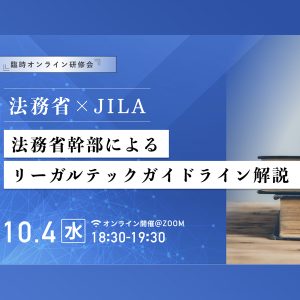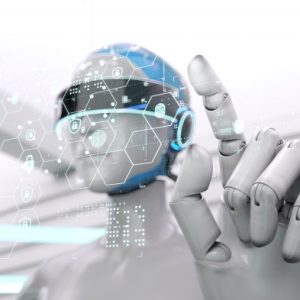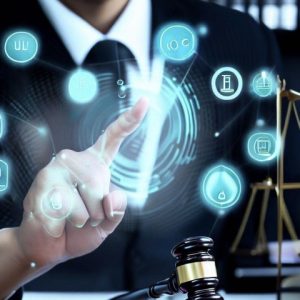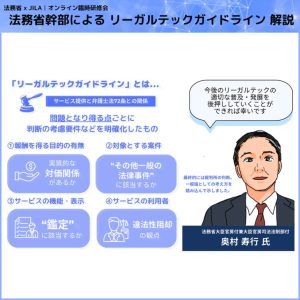Author
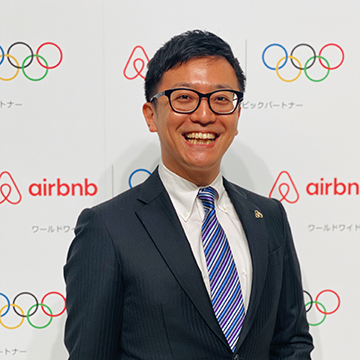 Yuichiro WATANABE
Yuichiro WATANABE
Attorney-at-law, Lead Counsel (Japan) at Airbnb
Member of the Board of Japan In-House Lawyers Association (JILA)
Yuichiro graduated from the University of Tokyo, School of Law (J.D.). He is the youngest person to win In-House Lawyer of the Year (Japan Law Awards). He served as a governmental study group member of the “Digital Extraordinary Administrative Advisory Committee”, “Study Group on the New Governance Model in Society 5.0” at the Ministry of Economy, Trade and Industry (METI) of Japan. His mission is to empower emerging in-house lawyers in Japan.
(*)personal views only
1. Purpose
This article intends to provide an outline of the recent regulatory reform of the Attorneys Act (Act No. 205 of 1949, as amended).
The article will help you to: (a) understand the central issue; and (b) understand what you can expect regarding the Ministry of Justice (“MOJ”)’s regulatory reform of the Attorneys Act in 2023.
2. Issue
The central issue was: Does an AI contract review service provider without a license violate the UPL (unauthorized practice of law) under Article 72(*) of the Attorneys Act?
3. Legal Defenses by AI Contract Review Service Provider
An act violates Article 72 and is subject to criminal sanctions if all six elements below are triggered.
What is an AI contract review service provider’s legal defense regarding the six elements under Article 72?
- Firstly, an AI contract review service provider would not dispute that element Nos. 1, 2, and 5 are triggered in the course of their business.
- Secondly, a practitioner argues that element No. 6 would be denied; thus, there is no illegality given that an AI contract review end-user utilizes the service for/by themselves. However, to the best of my knowledge, this theory is neither widely supported nor focused on in the government discussion.
- Thirdly, given the above, the main legal defenses of an AI contract review service provider will rely on element Nos. 3 and 4:
- arguing that they do not provide “an expert opinion” mainly because their AI contract review is still primitive (i.e., natural language processing where they merely compare each word without legal knowledge or expertise); and
- arguing, even if it falls under “legal services” including expert opinion, they do not engage in a “legal case” in a real dispute.
Article 72
| 1 |
no person other than an attorney or a legal professional corporation |
✓ |
| 2 |
for the purpose of earning compensation |
✓ |
| 3 |
engage in the legal services [法律事務] such as provision of an expert opinion [鑑定], representation, mediation, or settlement |
? |
| 4 |
of [〜に関して] the case for which an appeal is filed with the administrative authority, including a request for administrative review, objection, request for re-examination or other general legal cases [その他一般の法律事件] |
? |
| 5 |
as a business [業とすること] |
✓ |
| 6 |
the legal service is provided for another person [他人性 = 自己の法律事務に該当しないこと] |
(?) |
At the working-group of the Regulatory Reform Council on November 11, 2022, the MOJ expressly confirmed and clarified that: element No. 4 shall require a dispute. In the MOJ’s own words, it requires “that the legal rights and obligations must be disputed or in doubt to the same extent as in the enumerated cases like a lawsuit and other specific examples”. [列挙されている訴訟事件その他の具体的例示に準ずる程度に法律上の権利義務に争いがあり、あるいは疑義を有するものであることが要求される] This would indicate that if a contract does not relate to an ongoing dispute (e.g., reviewing a contractor agreement agreed and executed without issue), an AI contract review of such a contract would not violate Article 72 due to a lack of element No. 4 above.
4. Regulatory Reform Council
Before early 2022
The MOJ has not consolidated their views on Article 72 in the context of AI contract review services. To be fair, the MOJ did not ignore the issue and, from time to time, they sincerely responded to some ad-hoc inquiries where a legal professional may read between the lines and understand the MOJ’s position.
Emerging Issue in 2022
The emerging issue in 2022 was: the media broadcast the MOJ’s response(**) slightly inaccurately and negatively; as a result, the average business person could be misled and believe that an AI contract service would violate the Attorneys Act. Again, the truth was: the MOJ’s responses were carefully drafted and expressly admitted that, with certain conditions, the service would not violate the law.
AI contract review service providers and their industry organization asked for assistance from the Regulatory Reform Council to try pushing back against negative public sentiment.
Regulatory Reform Council on November 11, 2022
The Regulatory Reform Council had decided to discuss matters and invited the MOJ, an expert, and stakeholders to the meeting. The meeting was held on November 11, 2022. The author was invited as a legaltech expert and provided a view for discussion(***).
Regulatory Reform Plan [Draft](****) in December 2022
Here, the Regulatory Reform Council recommended to the Government that: the MOJ, within 2023, must take the necessary action to clarify application of Article 72 on AI contract review services. The draft recommended that the MOJ issue a new safe harbor (guideline).
エ 契約書の自動レビューサービスと弁護士法
【令和4年度検討】
法務省は、契約書審査やナレッジマネジメントにおけるAIの有用性及び民間企業の法務部門におけるデジタル技術の活用拡大の重要性に鑑み、契約書の自動レビューサービスの提供と弁護士法(昭和24年法律第205号)第72条本文との関係について、予測可能性を可能な限り高めるため、当該サービスの提供に係るガイドラインの作成・公表を含め、必要な検討を行う。
5. For Your Information
For more details, we have published articles consolidating our research and study since December 2021 below. The articles (in Japanese) covered the latest papers/research regarding legaltech (AI contract review and Attorneys Act) in Japan. We trust that the articles will accelerate your research and help to save your precious time.
- 渡部友一郎=角田龍哉=玉虫香里『弁護士法72条とリーガルテックの規制デザイン(上)』ビジネス法務2023年2月号92-96頁 [URL]
- 渡部友一郎=角田龍哉=玉虫香里『弁護士法72条とリーガルテックの規制デザイン(下)』ビジネス法務2023年3月号131-135頁[URL]
If I can assist you, please feel free to reach out to me via my blog “contact” page (https://lawyer.sakura.ne.jp/inhouse/). I would be happy to assist you.
Appendix
(*) Article 72 of the Attorneys Act is as below:
Chapter IX Regulations on the Handling of Legal Services
Article 72 (Prohibition of the Provision of Legal Services by Non-Attorneys)
No person other than an attorney or a legal professional corporation may, for the purpose of earning compensation, engage in the legal services such as provision of an expert opinion, representation, mediation, or settlement of the case for which an appeal is filed with the administrative authority, including a request for administrative review, objection, request for re-examination or other general legal cases, or may engage in mediation services related to these cases; provided, however, this does not apply if otherwise provided in this Act or other laws.
第九章 法律事務の取扱いに関する取締り
第72条(非弁護士の法律事務の取扱い等の禁止)
弁護士又は弁護士法人でない者は、報酬を得る目的で訴訟事件、非訟事件及び審査請求、異議申立て、再審査請求等行政庁に対する不服申立事件その他一般の法律事件に関して鑑定、代理、仲裁若しくは和解その他の法律事務を取り扱い、又はこれらの周旋をすることを業とすることができない。ただし、この法律又は他の法律に別段の定めがある場合は、この限りでない。
(**) The Act on Strengthening Industrial Competitiveness provides “System to Remove Gray Zone Areas” [グレーゾーン解消制度] to seek a regulator’s view in writing. Note that, the issued view under “Areas” is not at all legally binding. Also, it is only intended to provide guidance on the inquired individual business plan, not affecting other companies. In this case, an anonymous company sought the MOJ’s view on their individual legaltech-related business plan, and the MOJ’s response was misused to broadly impact legaltech service industries.
(***) Please refer to the following websites:
(****) https://www8.cao.go.jp/kisei-kaikaku/kisei/meeting/committee/221222/221222general_02.pdf
関連記事(Related Articles):

 Yuichiro WATANABE
Yuichiro WATANABE